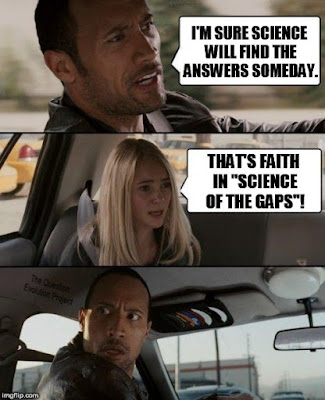Faith in Science of the Gaps
Atheists will tell you that they have no need for religion because they believe in reason and science. If you point out that atheism is a religion, they tend to get on the prod, which shows their ignorance of religion and philosophy. Further, secularists have hijacked science from its biblical basis, and argue from their a priori presuppositions, one of which is the arbitrary assertion that science must be based upon atheistic methodological and philosophical naturalism only. Such assertions are irrational and lead to faulty conclusions.
 |
| Used under Fair Use provisions for educational purposes. Also, note the question-begging straw man in the assertion. |
Science cannot work under an atheistic worldview, which is irrational and incoherent. It can only exist in a biblical worldview, where laws of logic and the constancy of nature make sense. Atheists have some serious problems with their faith-based "Science of the Gaps" approach, especially when it comes to the first cause. If you study on it, you'll see that science does not support atheism.
Atheists often use science to argue that God does not exist because He is no longer required. God was a convenient idea that answered any problem and could never be disproven. In times past, God was needed for the things we couldn’t explain—He was God of the gaps in our knowledge. Now science is closing gaps in our knowledge, and as those gaps disappear, so does God.I hope you will read the rest of this extremely interesting and enlightening article. To do so, just click on "Science of the gaps".
Proponents of this argument complain that ‘God did it’ is an unscientific and unreasonable explanation for observations that we make. Theirs is a strong argument against superstitious beliefs in God—i.e. using the supernatural to explain the unknown. When the supernatural is used merely to plug gaps, it will of course disappear when the gaps disappear. We no longer need Thor to explain thunder and lightning, because discovering electricity provided a natural explanation. We don’t need Poseidon either, because we now know the wind and moon cause waves and tides.
